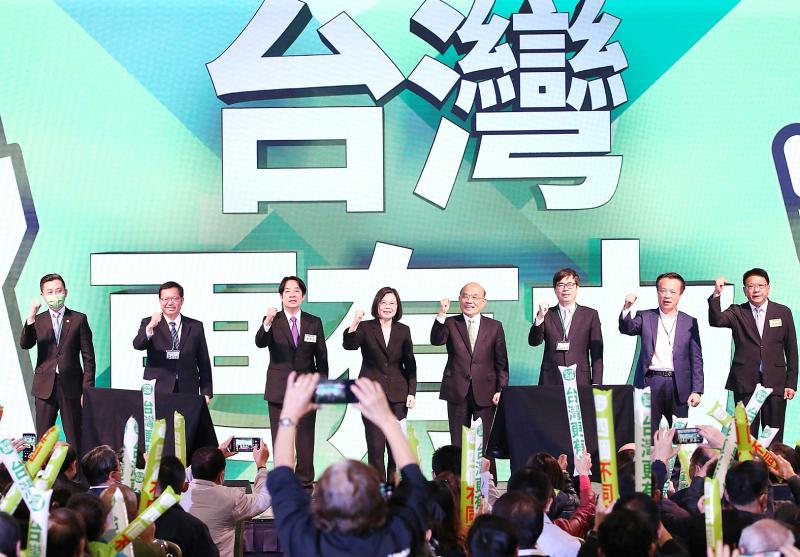Next month’s referendums would determine the direction of Taiwan’s development, the Democratic Progressive Party (DPP) said yesterday at its National Congress.
As the Dec. 18 poll approaches, the party convened its congress to affirm its opposition to all four referendum questions and urge the public to “lend a hand” in stabilizing the nation’s direction.
On the ballot are to be proposals calling for a ban on the importation of pork containing the leanness-enhancing additive ractopamine, the activation of the mothballed Fourth Nuclear Power Plant, the relocation of a planned liquefied natural gas terminal from Datan Borough (大潭) in Taoyuan’s Guanyin District (觀音) and for referendums to be held alongside elections.

Photo: CNA
Protecting the nation’s sovereignty and safeguarding freedom and democracy have always been the party’s guiding values, which it has firmly upheld since taking office in 2016, the DPP said.
Even when challenged by the COVID-19 pandemic and diplomatic interference, the government has remained steadfast in its beliefs and slowly, but surely strengthened the nation, it said.
“As the world recognizes Taiwan, we must strive to align ourselves with the world” by joining regional trade groups, such as the Comprehensive and Progressive Agreement for Trans-Pacific Partnership, the DPP added.
In her capacity as DPP chairperson, President Tsai Ing-wen (蔡英文) said the theme of this year’s congress, “Stable Governance, Powerful Taiwan,” is precisely the mission bestowed on the party at this juncture.
The DPP turned 35 this year, an age full of passion, but with enough experience to take on large responsibilities, she said.
As people do not owe the DPP anything, the party must do its best to prove it is worthy of their trust and confidence, she added.
The congress also approved a proposal by the party’s Central Executive Committee to forgo primaries for next year’s local elections, except for cities or counties that have been governed continuously by DPP incumbents for two terms.
According to the rule, which is to apply only to next year’s local elections, Tsai is to nominate mayoral candidates for the six special municipalities, while the committee is to vote on their confirmation.
Incumbent DPP mayors and county commissioners who seek re-election must also be approved by Tsai and confirmed by the committee.
Party hopefuls making a bid to unseat a non-DPP mayor or commissioner would be nominated by Tsai and determined in closed-door negotiations, it said.

The Central Election Commission has amended election and recall regulations to require elected office candidates to provide proof that they have no Chinese citizenship, a Cabinet report said. The commission on Oct. 29 last year revised the Measures for the Permission of Family-based Residence, Long-term Residence and Settlement of People from the Mainland Area in the Taiwan Area (大陸地區人民在台灣地區依親居留長期居留或定居許可辦法), the Executive Yuan said in a report it submitted to the legislature for review. The revision requires Chinese citizens applying for permanent residency to submit notarial documents showing that they have lost their Chinese household record and have renounced — or have never

A magnitude 5.6 earthquake struck off the coast of Yilan County at 12:37pm today, with clear shaking felt across much of northern Taiwan. There were no immediate reports of damage. The epicenter of the quake was 16.9km east-southeast of Yilan County Hall offshore at a depth of 66.8km, Central Weather Administration (CWA) data showed. The maximum intensity registered at a 4 in Yilan County’s Nanao Township (南澳) on Taiwan’s seven-tier scale. Other parts of Yilan, as well as certain areas of Hualien County, Taipei, New Taipei City, Taoyuan, Hsinchu County, Taichung and Miaoli County, recorded intensities of 3. Residents of Yilan County and Taipei received

Taiwan has secured another breakthrough in fruit exports, with jujubes, dragon fruit and lychees approved for shipment to the EU, the Ministry of Agriculture said yesterday. The Animal and Plant Health Inspection Agency on Thursday received formal notification of the approval from the EU, the ministry said, adding that the decision was expected to expand Taiwanese fruit producers’ access to high-end European markets. Taiwan exported 126 tonnes of lychees last year, valued at US$1.48 million, with Japan accounting for 102 tonnes. Other export destinations included New Zealand, Hong Kong, the US and Australia, ministry data showed. Jujube exports totaled 103 tonnes, valued at

BIG SPENDERS: Foreign investors bought the most Taiwan equities since 2005, signaling confidence that an AI boom would continue to benefit chipmakers Taiwan Semiconductor Manufacturing Co’s (TSMC, 台積電) market capitalization swelled to US$2 trillion for the first time following a 4.25 percent rally in its American depositary receipts (ADR) overnight, putting the world’s biggest contract chipmaker sixth on the list of the world’s biggest companies by market capitalization, just behind Amazon.com Inc. The site CompaniesMarketcap.com ranked TSMC ahead of Saudi Aramco and Meta Platforms Inc. The Taiwanese company’s ADRs on Tuesday surged to US$385.75 on the New York Stock Exchange, as strong demand for artificial intelligence (AI) applications led to chip supply constraints and boost revenue growth to record-breaking levels. Each TSMC ADR represents